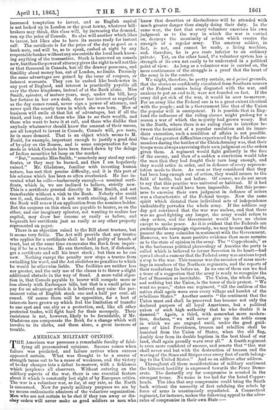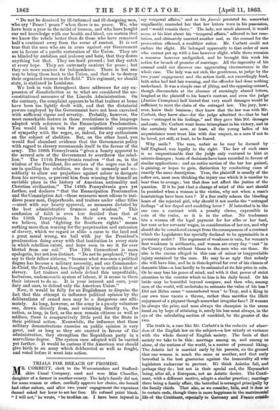increased temptation to invest, and as English capital know that
desertion or disobedience will be attended with is not locked up in London or the great towns, whatever bill- much greater danger than simply doing their duty. In the brokers may think, this class will, by increasing the demand, same way, the fact that every volunteer exercises his own run up the price of Consols. So also will another which likes judgment as to the way in which the war is carried. to invest, but likes also to have its means ready for Instant on, destroys the unanimity of action which creates the
call. The certificate is for the price of the day as good as a strength of a regular army. The amateur soldier, in banknote, and will be, so to speak, cashed at sight by any fact, is not, and cannot be made, a living machine, respectablebanker withoutany one outside the local bank know- and, therefore, he is pro tanto inferior to an ordinary ing, anything of the transaction. Stock is borrowed on consols private. Yet, on the other hand, to volunteer system has a now, butthenthepower of attorncygives the right to sell nottlus strength of its own not easily to be underrated in a political or that thousand in Consols, but all the drawer possesses, and point of view. As long as a volunteer war is carried on, the timidity about money has, out of London, no limits. Precisely mere continuance of the struggle is a proof that the heart of the same advantages are gained by the issue of coupons, or the army is in the contest. interest warrants. They can be cashed like bank-notes in We might, therefore, be pretty certain, on a priori grounds, any part of England, and interest is practically payable all that the stories so confidently circulated from Southern sources. over the three kingdoms, instead of at the Bank alone. Miss of the Federal armies being disgusted with the war, and Smith, spinster, of mature years, may, under the bill, keep anxious to put an end to it, were not founded on fact. If the her fortune in her own desk, draw her interest as regularly army did get sick of the war, it would be over to-morrow. as the day comes round, never sign a power of attorney, and For an army like the Federal one is to a great extent identical never quit the county town in which she was born. Men of with the people ; and in a Government like that of the Union business will smile at that list of advantages, but if all the the popular will is omnipotent. It is possible that in Eng- timid, and lazy, and those who like to see their wealth, and land the influence of the ruling classes might prolong for a those who want to have it at call, and those who dislike that season a war of which the majority had grown weary. But anybody whatsoever should know the amount of their means, in the North, where there is no ruling class to interfere be- are all tempted to invest in Consols, Consols will, pro tanto, tween the fel mation of a popular resolution and its imme- be in more demand. That is an object which seems to M. diate execution, such a condition of affairs is not possible. Fould, for example, important enough to justify a good deal One of the greatest difficulties experienced by the Federal com- a by-play on the Bourse, and is some compensation for the manders during the battles of the Chickahominy was, that their mode in which Consols have been forced down by the deluge troops were always exercising their own judgment on the orders
banished from the Union of States, when the old flag,
"Do not be deceived by ill-informed and ill-designing men, who cry Peace ! peace !' when there is no peace. We, who have been a year in the midst of treason, and who have bought our sad knowledge with our health and blood, are certain that -we know the rebels better than do those who have remained half a continent away from the scene of contest. It is not true that the men who are in arms against our Government are in favour of a pacific restoration of the 'Union. They are so blinded by ambition and jealousy and hate, that they desire anything but that. They are hard pressed ; but they catch at every hope. They are extremely anxious for peace ; but they are more anxious for independence. There is but one way to bring them back to the Union, and that is to destroy their organized treason in the field." This regiment, we should state is stationed in Louisiana.
Tife look in vain throughout these addresses for any ex- pression of dissatisfaction as to what are considered the un- constitutional measures of the Lincoln Administration. On the contrary, the complaint appears to be that traitors at home have been too lightly dealt with, and that the dictatorial powers employed by the Government have not been exercised with sufficient vigour and severity. Probably, however, the most remarkable feature in these resolutions is the language adopted with reference to the Emancipation Proclamation. You would look in vain for any sentimental expression of sympathy with the negro, or, indeed, for any enthusiasm on the subject of abolition. But, on the other hand, you would find abundant evidence that the Government policy with regard to slavery recommends itself to the favour of the army. The 100th Pennsylvania "gives a hearty approval to the several acts of the Government to overthrow the rebel- lion." The 111th Pennyslvank resolves "that as, in the wisdom of the President, the services of the negro can be of use in quelling the rebellion, we deem it unmanly and un- soldierly to allow our prejudices against colour to derogate from his services, or prevent him from winning for himself an enviable place in the history of American nationality and Christian civilization." The 149th Pennyslvania goes yet further, and declares "that the Emancipation Proclamation and the Conscription Act--those measures most odious to insi- dious peace men, Copperheads, and traitors under other titles —meet with our hearty approval, as measures dictated by the best administrative firmness and wisdom." This confession of faith is even less decided than that of the 150th Pennyslvania. In their own words, " as, we believe, that'fighting for Southern rights' means nothing more than warring for the perpetuation and extension of slavery, which we regard as alike a curse to the land and a great moral wrong, we hail with joy the President's proclamation doing away with that institution in every state in which rebellion exists, and hope soon to see it for ever blotted from our soil." The 12th Connecticut is more apologetic, but not less distinct. "Do not be perplexed," they say to their fellow citizens, "because what was once a political dogma has become a military necessity, and our Commander- in-Chief, the President, has thought it wise to strike a blow at slavery. Let traitors and rebels defend this unprofitable, barbarous, undemocratic system of labour, if it seems to them their interest to do so. It is your interest and ours, your duty and ours, to defend only the American Union." Now, it would be folly for an Englishman to disguise the fact that this attempt to influence political opinion by the deliberations of armed men may be a dangerous one ulti- mately. As long, however, as the army is a putely volunteer one, drawn directly from, and returning directly to, the nation, as long, in fact, as the men remain citizens as well as soldiers, there is comparatively little peril for the State in their political action. Meanwhile, the influence that these military demonstrations exercise on public opinion is very great, and as long as they are exerted in favour of the administration, they strengthen the Republican party in a marvellous degree. The system once adopted will be carried yet further. It would be curious if the American war should give birth to an army which deliberated as well as fought, and voted before it went into action.































 Previous page
Previous page